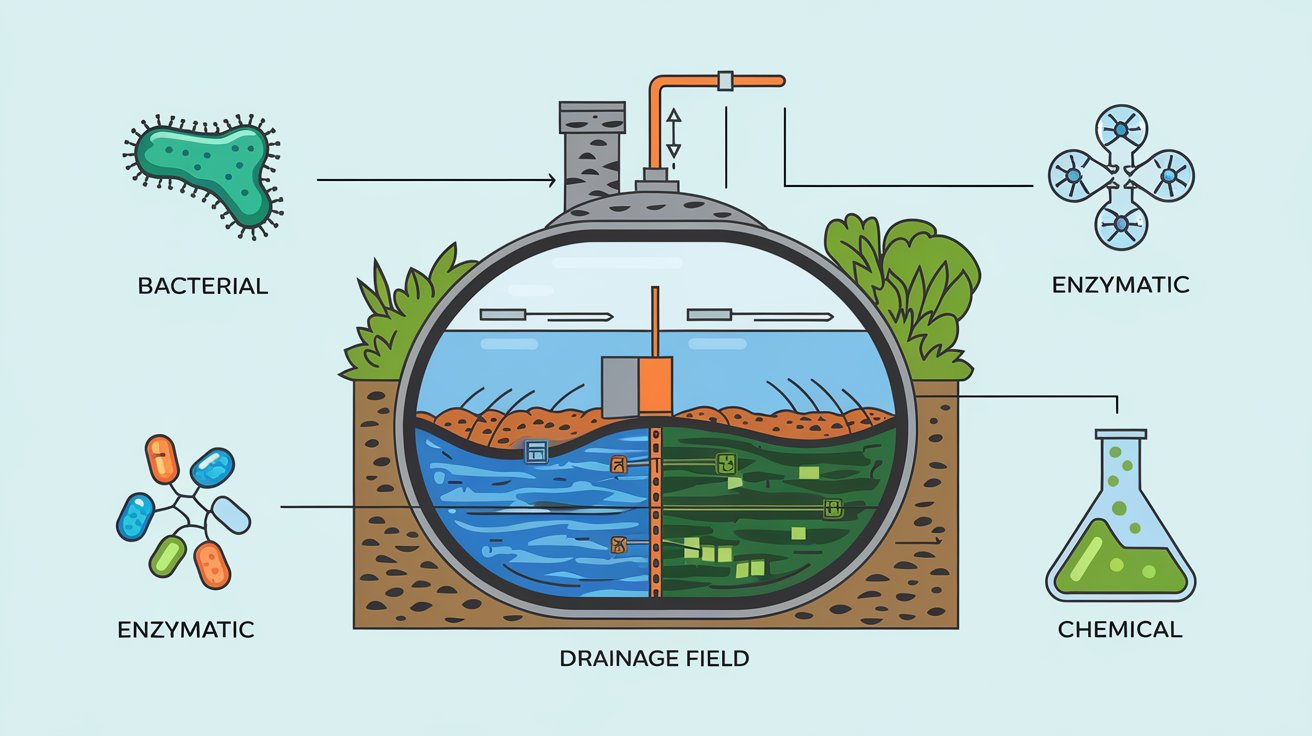Septic tank additives play a vital role in maintaining the health and efficiency of septic systems. These products, designed to break down waste and promote proper drainage, come in various forms, each with specific benefits. Understanding the types of septic additives available—bacterial, enzymatic, and chemical—can help homeowners make informed choices to keep their systems functioning smoothly.
Table of Contents
In this guide, we’ll explore how these additives work, their advantages, and when to use them. Whether you’re dealing with slow drains or planning regular maintenance, knowing which additive suits your needs can save you time, money, and hassle. Let’s dive into the details to discover which option is right for your septic system.
Types of Septic Additives
When it comes to maintaining a healthy septic system, choosing the right additive is essential. Here’s a breakdown of the three main types of septic additives—bacterial, enzymatic, and chemical—and how they work.
1. Bacterial Additives
Bacterial additives introduce live bacteria into your septic tank to enhance its natural processes. These bacteria help break down organic solids, such as food waste and human waste, into smaller particles that the system can process more efficiently.
Benefits of Bacterial Additives:
- Improve the breakdown of waste.
- Restore bacteria levels when disrupted by cleaning chemicals.
- Reduce the risk of blockages and odors.
When to Use Bacterial Additives:
These additives are especially useful after your tank has been pumped or if you’ve used antibacterial products that may have killed off the natural bacteria in the system.
2. Enzymatic Additives
Enzymatic additives work by introducing enzymes that break down specific types of organic waste, such as fats, oils, proteins, or carbohydrates. Unlike bacteria, enzymes are not living organisms—they are chemical compounds that speed up the decomposition process.
How Enzymatic Additives Work:
- Enzymes act as catalysts to break down waste into simpler compounds.
- Help prevent grease or sludge buildup.
Best Practices for Enzymatic Additives:
These products are ideal for systems that experience issues with grease or oil accumulation. Regular use can keep the system running smoothly without harming its natural bacterial balance.
3. Chemical Additives
Chemical additives are powerful solutions designed to break down waste quickly. However, they often use harsh chemicals, such as sulfuric acid or chlorine, that can harm the natural bacteria in your tank and potentially damage your system.
Advantages of Chemical Additives:
- Quickly clear clogs or blockages.
- May help in emergency situations when immediate action is needed.
4. Potential Risks:
4. Potential Risks:
Overuse can harm the natural ecosystem in the septic tank.
- Chemicals may leach into the surrounding soil, causing environmental concerns.
While chemical additives may offer a quick fix, they are generally not recommended for regular use due to their potential long-term effects on your septic system and the environment.
How to Choose the Right Additive
Selecting the right septic additive depends on several factors, including the condition of your septic system, the type of waste it handles, and your maintenance goals. Let’s explore the key considerations when choosing among the types of septic additives available.
1. Assess Your System’s Needs
Start by evaluating your septic system. Is it experiencing frequent clogs or odors? Are you dealing with slow drainage? If your tank has been recently pumped or exposed to harsh chemicals, bacterial additives may be your best choice to restore the balance of microbes. For grease-heavy waste, enzymatic products might be more effective.
2. Consider Additive Pros and Cons
Each type of septic additive comes with benefits and limitations:
- Bacterial Additives: Best for maintaining a natural balance in the tank. Suitable for regular maintenance.
- Enzymatic Additives: Ideal for targeting specific types of waste, such as fats or oils. Useful as a supplement to bacterial activity.
- Chemical Additives: Effective for emergencies but risky for long-term use due to potential damage to the tank’s ecosystem and surrounding environment.
3. Review Environmental Impact
If sustainability is a priority, enzymatic and bacterial additives are more eco-friendly than chemical options. Chemical additives, while effective in the short term, can harm beneficial bacteria and contaminate soil. Always opt for environmentally safe products whenever possible.
4. Check Regulatory Guidelines
Some regions have regulations regarding the use of septic additives, particularly chemicals. Research local guidelines to ensure compliance and avoid potential fines or damage to your system.
5. Seek Professional Advice
If you’re unsure which additive is right for your system, consult with a septic professional. They can provide recommendations based on your tank’s condition and usage patterns.
Are Septic Additives Necessary?
The necessity of septic additives has been a topic of debate among homeowners and septic professionals. While some swear by their benefits, others question whether they are essential for a well-functioning septic system. Let’s address common misconceptions and explore whether these products are truly needed.
Do Septic Tanks Work Without Additives?
A properly designed and maintained septic system doesn’t always require additives. The natural bacteria already present in the tank can break down waste effectively under normal conditions. However, certain factors, such as the use of antibacterial cleaners, heavy system usage, or frequent grease disposal, can disrupt this natural process. In these cases, additives may help restore balance and improve efficiency.
Benefits of Using Septic Additives
- Restores Bacteria Levels: Additives can replenish bacteria levels when disrupted by household chemicals.
- Enhances Waste Breakdown: Enzymatic and bacterial additives can accelerate the decomposition process.
- Prevents Blockages: Regular use can minimize sludge buildup, reducing the risk of clogs.
Environmental Considerations
Although bacterial and enzymatic additives are generally safe for the environment, chemical additives can pose risks. Harsh chemicals may leach into the soil, affecting groundwater and surrounding ecosystems. Homeowners should prioritize environmentally friendly options whenever possible.
When Additives May Not Be Necessary
- Routine Maintenance: If your system is regularly pumped and used responsibly, additives may not provide significant added value.
- Minimal Disruption: Homes that avoid flushing harmful substances and practice proper waste disposal may not need additional support for their septic system.
Alternatives to Additives
Instead of relying solely on additives, consider these maintenance tips:
- Pump your tank regularly to prevent overflows.
- Avoid flushing non-biodegradable items.
- Limit the use of antibacterial products that kill beneficial bacteria.
While additives can be beneficial in certain situations, they are not always necessary. The key is to evaluate your septic system’s needs and make informed decisions that balance effectiveness with environmental responsibility.
Maintaining a septic system is vital for its longevity and performance, and septic additives can play an important role in this process. Understanding the types of septic additives—bacterial, enzymatic, and chemical—empowers homeowners to make informed decisions tailored to their system’s unique needs.
Bacterial additives help restore balance, enzymatic products target specific waste types, and chemical solutions can offer emergency fixes (though they come with risks). However, not every system requires additives. For those with well-maintained septic systems, regular pumping and mindful practices may suffice.
When considering an additive, assess your system’s condition, review the pros and cons of each type, and prioritize eco-friendly options to protect both your system and the environment. By taking these steps, you can keep your septic system running efficiently and avoid costly repairs.
Septifix







